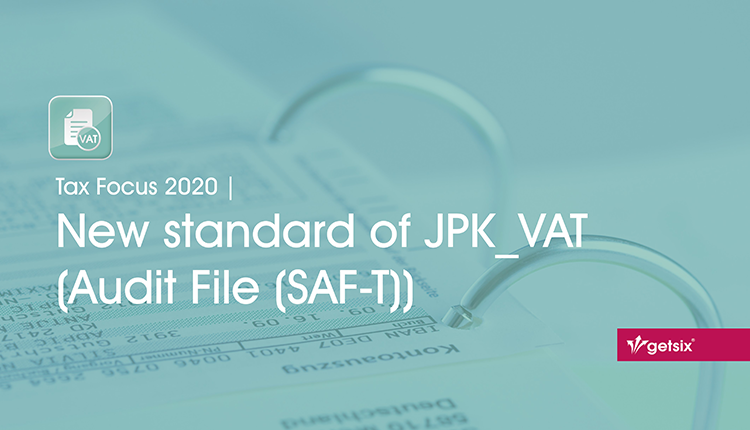New standard of JPK_VAT (Audit File (SAF-T))
From 1 October 2020 the currently used VAT-7 and VAT-7K declarations will be replaced by one electronic document JPK_VAT which is:
- JPK_V7M- for taxpayers who have declared monthly VAT settlements, or
- JPK_V7K – for taxpayers who have declared quarterly VAT settlements.
The new JPK_VAT was supposed to come into force on 1 April 2020 for large entrepreneurs and on 1 July this year for micro, small and medium-sized enterprises. However, due to the epidemic situation, these deadlines were initially postponed to 1 July 2020, and ultimately all VAT taxpayers will have to apply it from 1 October 2020. The introduction of the new JPK_VAT aims to make settlements easier for entrepreneurs and also to improve the work of the tax authorities.
The new structure of JPK_VAT will include a declaration part, corresponding to the current VAT-7 and VAT-7K declarations and a recording part, similar to the current JPK_VAT file supplemented with additional information. The deadline for submitting JPK_V7M for a given month will be the 25th day of the following month. In case of JPK_V7K, the deadline for submission of a recording part for a given month will be the 25th day of the following month, and the deadline for submission of a declaration part will be the 25th day of the month following the quarter.
| JPK V7M | JPK V7K |
|---|---|
|
|
Example
The taxpayer settles VAT quarterly. From 1 October 2020 he/she will be obliged to send a new JPK_V7K.
From that moment the taxpayer will be obliged to send:
- JPK_V7K, in which only the recording part for October will be filled in – by 25 November 2020,
- JPK_V7K, in which only the recording part for November will be filled in – by 25 December 2020,
- JPK_V7K, which will contain the completed recording part for December and the declaration part for Q4 2020 – by 25 January 2021.
In addition, the introduction of the new JPK_VAT file will bring about the following changes:
- there will be no need to submit certain additional annexes to the declaration,
- the commodity group codes (GTU) will be introduced,
- certain transactions will be additionally marked,
- certain types of documents will also be marked.
These changes will require the adjustment of accounting programs and applications to the binding regulations.
Detailed information on the new JPK_VAT can be found at https://www.gov.pl/web/kas/struktury-jpk and in the Information Brochure on the structure of JPK_VAT with declaration (JPK_V7M, JPK_V7K), which is available there.
No need to submit certain additional annexes to the declaration
In order to reduce the number of documents to be submitted, as soon as the new JPK_VAT comes into force, it will be no more necessary to submit the following annexes:
- VAT-ZZ – a form used to apply for a VAT refund;
- VAT-ZD – a form used to apply for bad debt relief;
- VAT-ZT – a form used to request an accelerated VAT refund.
The obligation to submit the other annexes remains unchanged.
Commodity group codes – GTU
The new JPK_V7M and JPK_V7K files impose the obligation to use commodity group codes for sales invoices containing specific goods or services listed in a special catalogue. These codes will not apply to all goods and services, but only those most vulnerable to VAT fraud. All groups to be marked on an invoice with the relevant GTU code are listed in the Information Brochure on the structure of JPK_VAT with declaration (JPK_V7M, JPK_V7K) available at https://www.gov.pl/web/kas/struktury-jpk.
Additional symbols for certain transactions
The obligation to apply additional symbols from 1 October 2020 will apply to selected transactions. As in the case of GTU, this requirement will not affect all taxpayers. Entrepreneurs who carry out national transactions only (not subject to the mandatory split payment mechanism) will not be required to use these additional signs. Symbols of selected transactions both for output and input tax can be found in the Information Brochure on the structure of JPK_VAT with declaration (JPK_V7M, JPK_V7K) available at https://www.gov.pl/web/kas/struktury-jpk.
Marking of certain types of documents
From 1 October, certain types of documents (proofs of sales and purchase) will also be marked. The required markings are listed in the Information Brochure on the structure of JPK_VAT with declaration (JPK_V7M, JPK_V7K) available at https://www.gov.pl/web/kas/struktury-jpk.
Errors in the new JPK_VAT will be severely punished
Failure to comply with the obligation, i.e. to correctly mark transactions in the new JPK_VAT file will be severely punished. There are financial penalties foreseen for sending the JPK_VAT file, which will make it impossible to verify the correctness of transactions. A penalty for errors in the amount of PLN 500 will be charged for each error separately.
The penalty can be avoided either by correcting the sent JPK_VAT file or by submitting an appropriate explanation within 14 days, counting from the day the error is found, which is:
- the day on which the taxpayer detected the error or
- the date of receipt of the summons from the tax office (in case of detection of an error by the tax authority).
Source: https://www.gov.pl/web/kas/struktury-jpk
If you have any further questions or require additional information, please contact your business relationship person or use the enquiry form on the getsix® website.
***





